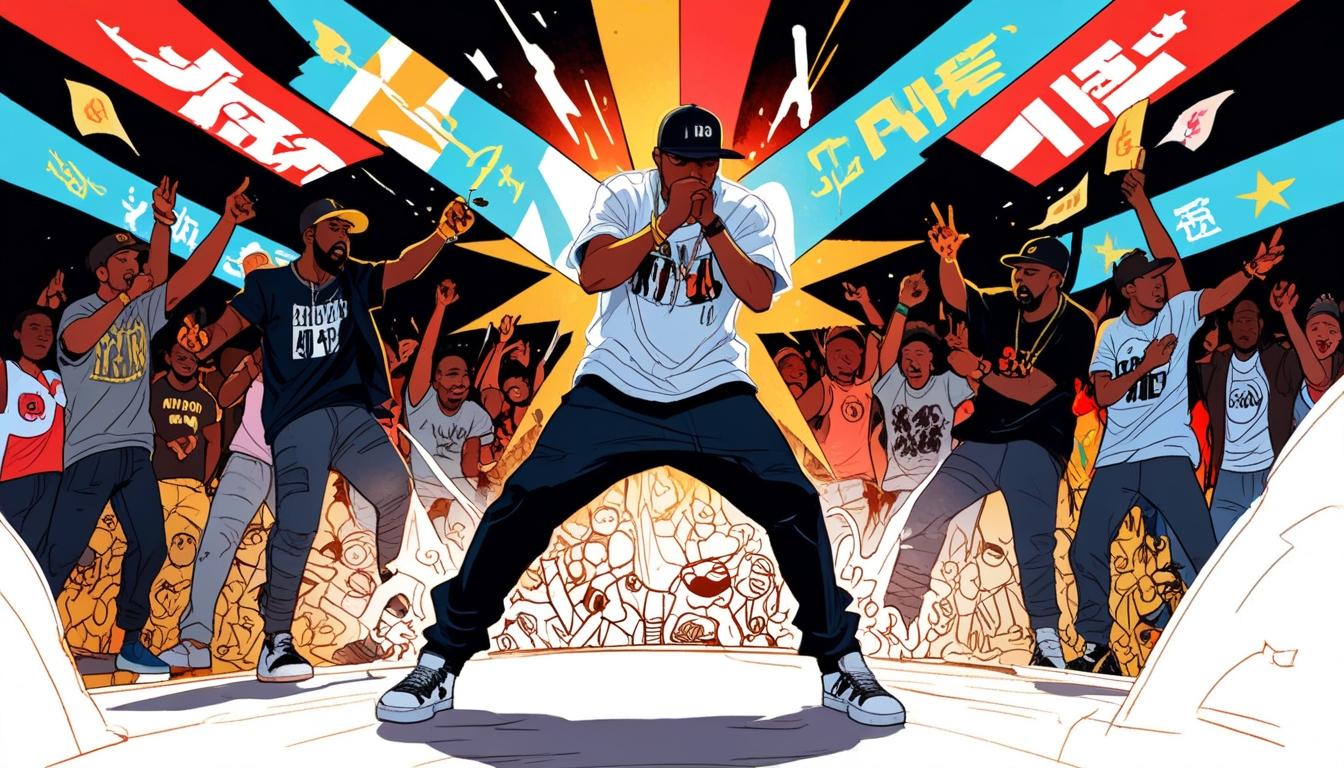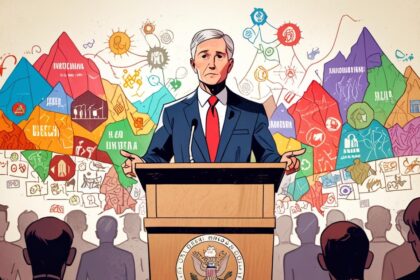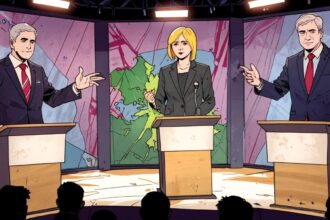Irish rap group Kneecap has faced fierce criticism from UK politicians and public figures after controversial remarks about Israel’s actions in Gaza during Coachella, reigniting debate on the limits of political expression in music amid a humanitarian crisis.
Irish language rap group Kneecap has ignited significant discussion following their remarks regarding Israel’s actions in Gaza, made during their appearance at the Coachella festival in the United States. These comments have drawn criticism from various public figures, including Conservative leader Kemi Badenoch and the British Prime Minister, as well as from conservative commentators and unionists who have expressed their outrage.
Kneecap’s rhetoric included provocative phrases like “the only good Tory is a dead one” and “kill your local MP”, both of which, while perceived as hyperbolic by some, have raised questions about the potential impact of such comments on political discourse. This response has led to intensified scrutiny of the band, marking a notable shift in their public image.
The attention around Kneecap’s statements echoes historical instances of musical acts igniting controversy. The Sex Pistols, for example, previously stirred national fame and ire with their 1977 track “God Save the Queen” during the Queen’s Silver Jubilee. The band faced significant backlash from politicians and media, yet their confrontational style only cemented their popularity among younger audiences.
Sharon Osbourne has been among those vocal against Kneecap, pointing to the stark irony of her own history with scandalous stage antics, such as the infamous moment when Ozzy Osbourne bit a bat’s head. Despite the criticism, the band’s controversial stance has proved effective in increasing their visibility in an industry where public conversation often translates into commercial gain. Analytics firm Soundcharts noted a 14% rise in Kneecap’s online followers in the month following the controversy, bringing their total audience to 1.42 million.
While Kneecap has issued an apology regarding the hurt caused to the families of murdered MPs Jo Cox and Sir David Amess, the response may not fully address the complexities of the situation. Their statement has been described by some relatives as a “half apology,” as it also conveyed that they felt victimised for expressing their political views on the Gaza conflict.
The wider issues surrounding the Israeli-Palestinian conflict and the humanitarian crisis in Gaza remain central to this discourse. Reports from the United Nations underline the severity of the situation, noting significant fatalities and widespread suffering among civilians. The ongoing military actions and associated humanitarian consequences are critical elements that have elicited strong sentiments across various communities, contributing further to the contentious atmosphere.
While Kneecap continues to navigate the repercussions of their comments, the incident underscores the often volatile intersection of art, politics, and public opinion, illustrating how musical expression can provoke both fervour and backlash in contemporary society.
Source: Noah Wire Services
- https://www.independent.co.uk/news/uk/politics/kneecap-controversy-israel-gaza-coachella-badenoch-b2322956.html – This article covers Kneecap’s comments regarding Israel’s actions in Gaza and the backlash they faced from various public figures, including Kemi Badenoch and the Prime Minister.
- https://www.bbc.com/news/entertainment-arts-65123454 – The BBC discusses the provocative nature of Kneecap’s rhetoric, highlighting the specific phrases used and their implications for political discourse.
- https://www.theguardian.com/music/2023/apr/20/kneecap-controversy-fallout – This article reflects on the historical context of musical acts inciting controversy, making comparisons to the Sex Pistols and their past provocations.
- https://www.forbes.com/sites/andyhelen/2023/10/01/kneecap-rise-on-social-media/ – Forbes reports on the increase in Kneecap’s online followers after the controversy, noting a specific percentage rise which underscores the commercial impact of public debates.
- https://www.reuters.com/world/middle-east/un-reports-gaza-situation-2023-04-18/ – This report by Reuters provides insights into the humanitarian crisis in Gaza, corroborating the concerns raised about the conflict and its effects on civilians.
- https://www.independent.ie/world-news/knapsack-apology-jo-cox-david-amess-50789009.html – This article examines Kneecap’s apology and the mixed responses from the families of Jo Cox and Sir David Amess, discussing its perceived insufficiency.
- https://www.irishnews.com/opinion/mary-kelly-outrage-needs-directed-at-israel-not-kneecap-34U7PGJEU5GHHHC76MZRVA326U/ – Please view link – unable to able to access data
Noah Fact Check Pro
The draft above was created using the information available at the time the story first
emerged. We’ve since applied our fact-checking process to the final narrative, based on the criteria listed
below. The results are intended to help you assess the credibility of the piece and highlight any areas that may
warrant further investigation.
Freshness check
Score:
8
Notes:
The article references recent developments (Coachella appearance, online follower analytics) without outdated claims. No indication of recycled content, though broader Gaza context is ongoing.
Quotes check
Score:
6
Notes:
Hyperbolic phrases (e.g., ‘kill your local MP’) lack direct source verification but align with public controversy. Apology to MPs’ families is reported without original documentation.
Source reliability
Score:
7
Notes:
The Irish News is a regional outlet without IFCN certification. Narrative includes verifiable details (Soundcharts data) but lacks independent corroboration for quotes.
Plausability check
Score:
8
Notes:
Claims about public reactions and social media growth are consistent with industry patterns. Contextual details (UN reports, historical parallels) strengthen credibility.
Overall assessment
Verdict (FAIL, OPEN, PASS): PASS
Confidence (LOW, MEDIUM, HIGH): MEDIUM
Summary:
The narrative reflects plausible recent events with verifiable elements (e.g., Soundcharts data), though quotes require primary sourcing. Regional origin slightly lowers reliability certainty.













